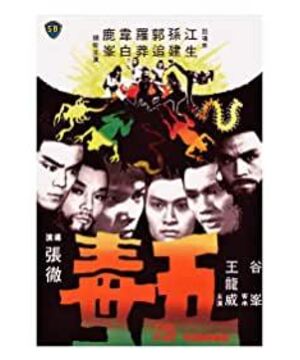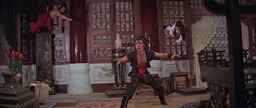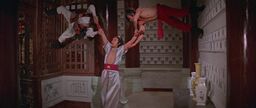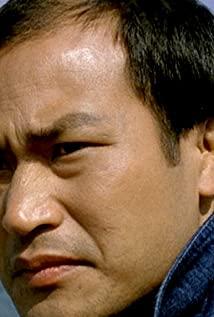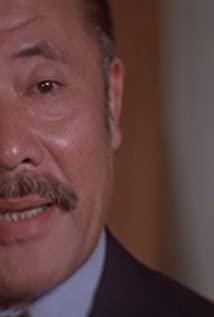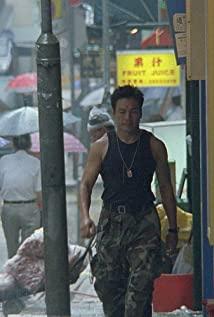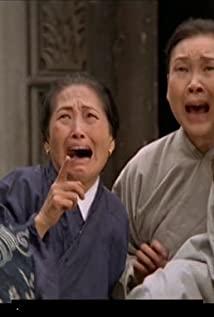Going back to the film itself, Zhang Che, who failed to start Longbow Films in Taiwan and returned to the Shao style, has been quite different from the previous period in his creative style and technique. In martial arts and action design, Zhang Che of this period emphasized hard-bridge and hard-horse fighting more than before. However, compared with his previous works, it does not show a peak, but has a strange color. In other words, there are fewer special effects, but the visual perception of martial arts is not unconventional. I think this is mainly due to the difference in the composition of the two Zhangjia class teams. From the early stage of Wang Yu, Jiang David and Ti Lung's non-professional martial arts background, the heroic spirit overwhelms the actual kung fu cast team, the transition to Guo Zhui, Lu Feng, Luo Mang and a group of professional martial artists are the grassroots lineup of the team, which makes its martial arts design more real and more diverse. "Five Poisons" and "Incomplete" are outstanding representatives of this new style. Of course, there is also Chen Guantai, a heavyweight in Zhang's movie, in "Incomplete", and "Five Poisons" is all supported by a group of grassroots. From the actual effect, it also has a special flavor. In the martial arts films before and after, the biggest impression of the Five Poisons teaching people is the Miao and the use of poison, and the portrayal in "The Sword of Jade Blood" is the most successful. But in "Five Poisons", Zhang did the opposite, abandoning the traditional characteristics of the Five Poisons, and focused on the martial arts of five poisons such as centipedes, snakes, scorpions, geckos and toads. In terms of characteristics, there is the amazing and dazzling martial arts show at the beginning of the movie.
After the great success in the beginning part, Zhang Che made a bold change in the plot design. The story of "Five Poisons" is based on the Five Poisons sect leader who explained before his death that the closed disciples went down the mountain and cleared the door to lead to the whole story line, played by Jiang Sheng The six apprentices learned the most comprehensive kung fu, but they were not proficient. They couldn't beat any brother one-on-one, but combining any one of them could kill others. However, due to the difference in entry time, these six people and the teacher-uncle who is carrying the treasure map do not know each other, which constitutes the biggest suspense of the play (although the effect is not very satisfactory). In terms of character design, Zhang Che made each character put on a mask when he appeared on the stage. In the subsequent plot development, he portrayed the good old gecko as both righteous and evil, and the youngest scorpion as a treacherous and loyal appearance. , Which makes the audience know the staff of Zhang’s class and guess which ones the protagonists are, but they will not be able to figure out the correspondence between the characters and the poisons until very later. This kind of treatment makes the film get rid of the dual structure of loyalty and evil in the past Zhang's films, and the duality of good and evil. It cannot but be said to be a useful exploration. Of course, more than half of this must be attributed to the co-writer Ni Kuang.
When it comes to weirdness, as a Chinese audience, you may not think it very much, but if you look at it from the perspective of Westerners, there are indeed many cult elements that are included, such as the ten thousand needles used to break the toad. Cut the throat with no blood to kill (it is very fresh), piercing needles (same as the crime tool in Di Renjie's "Iron Nail Case"), and the method of suffocating with wet paper (immediately reminiscent of Li Hanxiang's "Changing the Curtain" ). Although the martial arts design did not get rid of the style of Zhang's movies accustomed to hard bridges and hard horses, with so many novel elements as condiments, it must be dazzling enough for foreigners to watch. And from the perspective of the later styles of action films directed by Western directors such as Quentin, it seems that the fighting style of hard bridge and hard horse is more popular in the West than the elegant martial arts flying around on Via.
The advantages are obvious, but the disadvantages are also prominent. When Zhang Che manipulated small scenes like "Five Poisons", after all, he was still inferior to Chu Yuan and Sun Zhong. On the contrary, he was a bit like Hua Shan, who likes to imitate Chu Yuan, that is, the storyline is anticlimactic. The beginning part is often very exciting, catching the audience's eye tightly, while the plot unfolds with mediocre control ability, and the ending part is a bit unsatisfactory. Hua Shan’s problems in this area are very prominent, which directly led to the gap between him and Shao-style first-line directors. A typical example is "Blood Parrot". A similar problem appeared in "Five Poisons". The plot in the second half of the story progressed too quickly, destroying the integrity of the story, and the duel at the end was even more inexplicable. The scorpion played by Sun Jian gave people the feeling that he was far superior to the other brothers in strategy, and everything was under control (after several other people showed their true colors one after another, the audience should have guessed his identity long ago), and An Ran hides behind the boss laid out behind the scenes. But at the last moment, he would take the initiative to step onto the front desk so quickly, and he would break his own arm without making any sense (I can’t think of why he had to attack Silver Snake so quickly), resulting in no advantage in the final duel, and he was defeated. People on their own side attacked. The contrast between the front and the back really makes people wonder if Comrade Scorpion has a sudden convulsion. After completing the task of cleaning up the door, the gecko and the younger brother even underestimated the villainous magistrate played by Wang Longwei, which is far from the previously positioned image of hatred and hatred. Therefore, from the
perspective of a complete story , "Five Poisons" is destined to be a work with very distinctive but anticlimactic plots, which is a far cry from the fullness of Chuyuan's "Meteor Butterfly Sword". Compared with "Incomplete" filmed by Zhang Che later, there is also a gap.
So although this movie is worth watching, it can't be expected too much. It can only be regarded as an attempt by Zhang Che.
2009-05
View more about Five Deadly Venoms reviews


